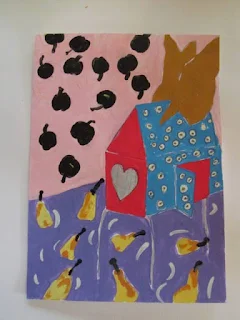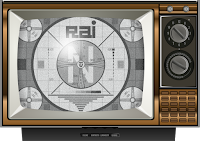
 There was a painting Jill had done for a show of hers at UCSD that featured small, mischievous devils scattered about the color-saturated straits of a particular portrait. Someone asked her what they were and she explained, laughing so slightly, that "...they were devils playing with the other things in the painting. I painted them because I like them. What they mean is private. Actually, I'm not even sure if I know what they mean..."
There was a painting Jill had done for a show of hers at UCSD that featured small, mischievous devils scattered about the color-saturated straits of a particular portrait. Someone asked her what they were and she explained, laughing so slightly, that "...they were devils playing with the other things in the painting. I painted them because I like them. What they mean is private. Actually, I'm not even sure if I know what they mean..."
I wouldn't doubt that at the time, Jill would have to create something that would contextualize the leitmotifs and tropes and her use of a flat style for a critical appreciation to be applied and calm those minds that demand how the contents of paint operate as a critique of how we live. Still, in the moment of creation and long afterward, she was taken with the joy of creating this space where instinct, dreams, mystery, and ominous ritual, combined in the odd and angular ways that fit Jill's idea of allowing forms to migrate, mutate, associate as they may.

 I remember Jill, in one of those graduate student bull sessions at the Pub following an art show she had been featured in, reflecting on the ideas of Derrida and deconstruction and the insight that because meaning is not fixed in a text, whether be it a book, painting, movie, play, saying that she gave her art over to the idea of play. "I don't think art needs to be about anything," she said firmly. I don't recall what she followed that declaration with. Still, I do recall many a conversation that artists can only be responsible for making the art and making sure that the pieces they introduce to the world have their own integrity, on their terms. "What the painting means isn't my job," she said at one point, "that would kill the happiness someone else could have creating their own meaning and sharing it with others." Jill was taken with the idea that art had no commitment to reaffirm or even threaten an audiences' shared cosmologies; the artist wasn't required to speak to how the world does or does not work or dwell in the joys or depressions that art lovers might project on the campus.
I remember Jill, in one of those graduate student bull sessions at the Pub following an art show she had been featured in, reflecting on the ideas of Derrida and deconstruction and the insight that because meaning is not fixed in a text, whether be it a book, painting, movie, play, saying that she gave her art over to the idea of play. "I don't think art needs to be about anything," she said firmly. I don't recall what she followed that declaration with. Still, I do recall many a conversation that artists can only be responsible for making the art and making sure that the pieces they introduce to the world have their own integrity, on their terms. "What the painting means isn't my job," she said at one point, "that would kill the happiness someone else could have creating their own meaning and sharing it with others." Jill was taken with the idea that art had no commitment to reaffirm or even threaten an audiences' shared cosmologies; the artist wasn't required to speak to how the world does or does not work or dwell in the joys or depressions that art lovers might project on the campus. The poetic analogs are obvious, I think, the first being Ars Poetica by Archibald McLeish.
Ars Poetica
A poem should be palpable and mute
As a globed fruit,
Dumb
As old medallions to the thumb,
Silent as the sleeve-worn stone
Of casement ledges where the moss has grown—
A poem should be wordless
As the flight of birds.
*
A poem should be motionless in time
As the moon climbs,
Leaving, as the moon releases
Twig by twig the night-entangled trees,
Leaving, as the moon behind the winter leaves,
Memory by memory the mind—
A poem should be motionless in time
As the moon climbs.
*
A poem should be equal to:
Not true.
For all the history of grief
An empty doorway and a maple leaf.
For love
The leaning grasses and two lights above the sea—
A poem should not mean
But be.






